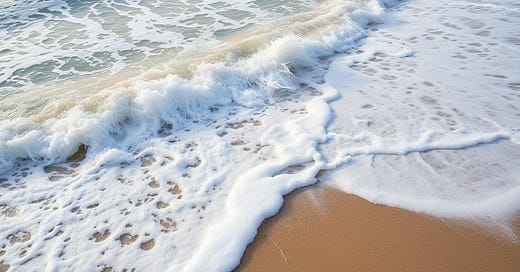A single suitcase.
A duffel bag.
A backpack.
That’s all I brought when I left.
I don’t remember exactly what I packed the night before I moved to France.
Back then, I wasn’t even sure I’d stay.
But I do remember the feeling:
the quiet adrenaline of departure,
checking my watch over and over,
afraid I’d miss the flight.
Lately, I’ve been thinking a lot about what immigrants carry—
the things you can pack,
and the things you can’t.
If, like so many migrants today, I had no choice in leaving,
what would I bring with me?
I watched the series 1883 recently.
It follows European settlers crossing the Oregon Trail,
chasing land, chasing hope.
The journey is brutal.
Many don’t make it.
And yet, it felt familiar—
an echo from the past
reminding us that in nearly 150 years,
not much has changed.
Humans are still chasing peace,
still willing to risk everything
for the chance to plant something new
in foreign soil.
The American West was no kinder to settlers
than the Mediterranean has been
to migrants from Africa and the Middle East.
River, ocean—
the water always demands a price.
But on the other side,
there’s at least a possibility:
A place to begin again.
When I think of my future—
and my children’s future—
I wonder how far they’ll drift
from that original homeland
of Macondo,
coffee beans,
green hills,
and Caribbean rain.
Did I bring enough with me to pass something on?
Did I carry more than just clothes and papers?
And then I remember:
some people arrive with only the shirts on their backs.
And still—
their hearts keep beating.
Their tongues still speak
the one thing that weighs nothing:
language.
Through language, we carry identity.
Through stories, we plant memory.
Through each word,
we leave something behind
for those who come next.
In Mija Season 2,
we told the story of a Chinese family in France.
Eleven people, divided.
The children sent to foster homes
“to help them assimilate.”
They were taught French.
Told to change their names.
Asked to forget.
The result?
They became French.
But at what cost?
Many first-generation French people live
with a split at their core—
unable to wear their flag of origin
without explanation or shame.
When the French team won the World Cup
with mostly African-born players,
Trevor Noah joked,
“Africa won the World Cup.”
France responded with outrage.
The identity doesn’t stretch far enough
to hold both truths at once.
But it begs the question:
When they go back—
if they go back—
do they feel French?
Do they feel like locals?
Or somewhere in between,
forever unrooted?
Did they receive enough
to recognize the faces of their ancestors?
To sing the songs?
To cook the dishes by memory?
Were they given the chance?
What can I do,
as a traveler,
a seed-planter,
to make sure my children have more
than just stories of where we came from?
I wonder if it’s enough—
this language,
this storytelling,
This effort to remember.
When I think about these things
I imagine standing by the sea, talking to the wind,
It's silence a reminder that these questions don’t yet have answers,
For we are forever starting again.
but…
If the wind blows in your direction,
fellow traveler,
Send me a reply.
Un Abrazo,
Lory aka Mija.
🎧 Mija Recommends:
Here are some recommended listens & watches if you enjoyed this week’s piece:
🌾 Watch: 1883 (Paramount+)
A raw and beautifully shot series about European settlers crossing the American West, and the personal toll of migration, dreams, and starting over.
🎙️ Listen: Cry Like a Boy – From Hero to Outcast
An emotional episode documenting the often-forgotten perspective of migrants who return home, and what happens when they come back empty-handed.
🎧 Mija Season 2, Episode 1: The story of a Chinese family in France
A deeply personal look at what it means to be divided across countries, systems, and expectations—and how identity evolves when you’re asked to forget where you came from.
PS.💌 For some time now, I have been on a creative break. I created life (!) and it made it hard to think about anything else. But I’m SLOWLY working up the courage to record again, to tell stories again, and this newsletter is step 1. If any of my work has resonated with you, hit reply. I’d love to hear from you.
Until next time, con besos y recuerdos de Mija.



